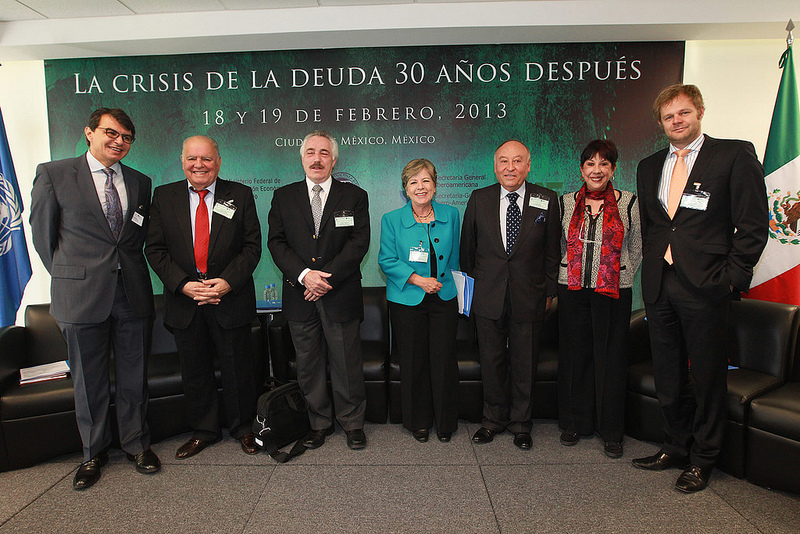Experts Highlight Lessons Learned in Latin America 30 Years after the Debt Crisis
Topic(s)
Representatives of the organizing institutions - ECLAC, CAF, SEGIB, GIZ and UNAM- opened the event.

(18 February 2013) At a high-level conference opened today in Mexico City, Mexico, authorities and experts highlighted the lessons learned by Latin American and Caribbean countries following the debt crisis in the early 1980s and called for pending challenges to be tackled.
The ECLAC-CAF-GIZ-SEGIB conference on "The debt crisis in Latin America 30 years later" will last until 19 February 2013 at the subregional headquarters of ECLAC in Mexico.
The two-day event is organized by ECLAC, the Development Bank of Latin America (CAF) the Ibero-American General Secretariat (SEGIB), the German Agency for International Cooperation (GIZ) and the National Autonomous University of Mexico (UNAM).
At the opening session Jacques Rogozinski, Director General of Mexico's Nacional Financiera, greeted participants on behalf of Luis Videgaray, the country's Secretary of Finance and Public Credit.
Alicia Bárcena, Executive Secretary of ECLAC, opened the conference by saying that "the Latin American debt crisis marked a turning point for the region, and had consequences that were more serious and wider reaching for Latin America and the Caribbean than those resulting from the recent global financial crisis".
She went on saying that "It took the region 25 years to regain the same social levels as before the crisis, and 14 years to recover per capita GDP".
During the 1980s, GDP growth was very variable, posting an annual average of 1.7%, whereas real wages fell by 34% between 1980 and 1990. In the 1990s, growth showed a recovery tendency and reached an annual average of 3.1%.
As a result of this poor economic performance, which also involved a rise in employment, poverty surged dramatically in the first few years.
According to Ms. Bárcena "the consequences of the crisis also often involved a deep transformation of development strategies and the role to be played by the State and private actors in the economy and social protection".
The ECLAC Executive Secretary stated "We need a broader vision of macroeconomic stability, with objectives not limited to reducing inflation and balancing public finances, but ones that concern the real sphere of production, including the scope and stability of the growth rate of the economy and employment. Macroeconomic policy should thus include aims of income distribution and structural change. There should be a positive feedback process between real stability and nominal stability".
The senior United Nations official added "this is the time to rethink development, to establish a future agenda focused around a main pillar of a new State architecture aimed at virtuous structural change for increased equality, based on citizens' entitlement to rights. Now we can lay the foundations to create more productivity through industrialization based on innovation and employment, with full rights, to achieve sustainable development".
The ECLAC Executive Secretary affirmed that "Latin America needs to redefine the State-market-society equation. Equality is needed for growth and growth is needed for equality. State intervention is needed to redistribute earnings in the light of such a heterogeneous production structure, so as to strengthen structural change for equality".
The conference is being attended by renowned regional academics and professionals who tackled this crisis from within their respective governments.
The following people also addressed the opening session: Enrique Iglesias, Ibero-American Secretary General of SEGIB, Enrique García, Executive President of CAF, Verónica Villarespe, Director of Institute of Economic Research of the Autonomous University of Mexico (UNAM) and Jan Peter Schemmel, Director of GIZ in Mexico.
Enrique Iglesias stated that several pillars should be taken into account when analysing the crisis: the international economic system, level of contagion due to major expansion of world finance, the psychology of optimistic and pessimistic thinking, and the role of the International Monetary Fund (IMF), which is a major play that has implemented huge changes.
Enrique García from CAF highlighted that Latin America had to recognize that the problem was one of solvency, not liquidity. He said we learned the lessons the hard way, adding that the region is still not out of that trap. If we want to solve the problem, we will have to grow by 6%, as well as strengthening institutions, creating infrastructure and promoting productive transformation.
Verónica Villarespe declared that the debt crisis was an excuse to introduce new policies that concentrated income in the region even more, and 30 years after the crisis she called for the lessons learned by each country to be applied.
Jan Peter Shemmel, of GIZ, was grateful for such an event and acknowledged that a meeting to analyse Latin American debt is highly relevant in the light of what is happening now in Europe: "Europe can learn from Latin America".
Lastly, Jacques Rogozinski made it clear that the same medicine could not be given for every illness, but rather the solution must be customized for each era and for the situation of each country.
Press contact:
ECLAC subregional headquarters México.
María Luisa Díaz de León. E-mail: marialuisa.diaz@cepal.org; Telephone: (52 55) 4170 5665.
ECLAC headquarters in Chile, Public Information and Web Services Section.
E-mail: prensa@cepal.org, Telephone: (562) 2210 2040.
Country(ies)
- Latin America and the Caribbean
-
Mexico
Contact
Public Information Unit
- prensa@cepal.org
- (56 2) 2210 2040